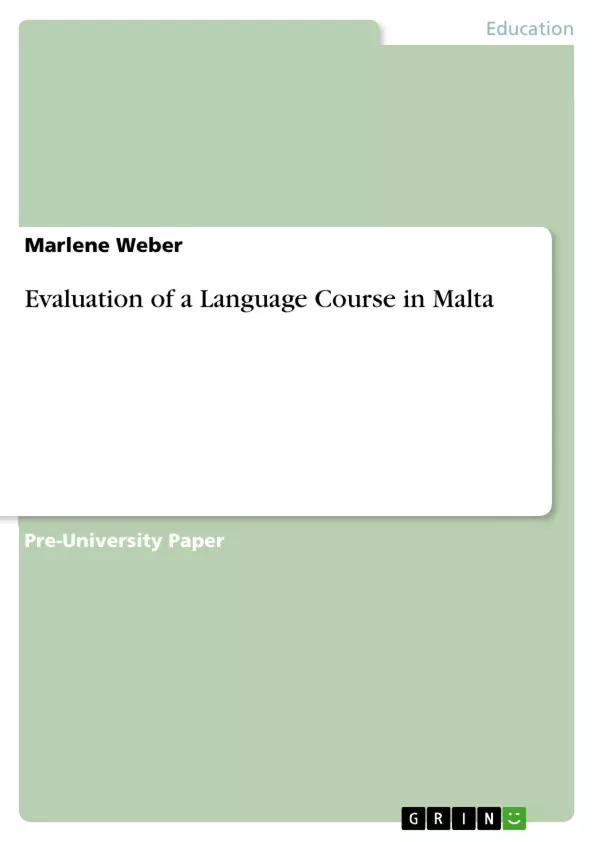In the past few years I recognized more and more students going on language courses abroad. Not only course in the U. S., but also courses within Europe strongly increase in popularity. There is a great variety of tender, from language courses that take only a few weeks or months, to so-called High-School-Years, professional business courses and even work and travel programs. At a first glance, it is very difficult to decide what to choose, but I would like to concentrate on language courses for students that last only a few weeks. I wanted to know why this is so fashionable nowadays and I began to think about this topic more intensively. I asked myself if this would not be a great thing for me to do, too. In the following pages I am going to examine such language courses in detail. I will present the different types of courses you can choose and the selection of accommodation available. There will also be an evaluation. I lead through a survey at Linguatime Language School in Sliema, Malta, to find out why so many students go on language holidays and if there is any progress possible at all. It has two parts, A and B. I distributed one at the beginning and one at the end of my stay in Malta to see if the students’ expectations were fulfilled or not. There can be seen positive and negative aspects that hopefully reveal the real image of such a trip. After my evaluation I am going to compare two particular language schools in Malta, the aspects will be the variety of courses, the accommodation types, the prices and the teachers. As a last point, in my conclusion, I am going to sum up the evaluation, so you will be able to see for yourself if such language courses really keep their promises. But at first, I want to have a closer look on the history of the country I chose for my stay. Malta has always been an interesting country for me because so many different cultures left their remains on its grounds. And although it is close to the African coast, it is still a part of Europe, which makes the journey much easier. Another advantage of Malta is the currency, for they have obtained the Euro in 2004. The thing I liked best of this island is that they have English as an official language. There are not so many countries so far in the south where you can speak English with native speakers and enjoy the warm climate as well; especially not in Europe.
Inhaltsverzeichnis (Table of Contents)
- Introduction
- A short overview on Malta's history
- Evaluation of my language course at Linguatime Language School in Malta in comparison to my own expectations
- Comparison between two language schools in Malta
- Conclusion
- References
- Appendix
Zielsetzung und Themenschwerpunkte (Objectives and Key Themes)
This work explores the popularity of language courses abroad, particularly those lasting a few weeks. It analyzes the reasons behind this trend and examines the effectiveness of such courses. The author aims to provide insight into the benefits and drawbacks of language immersion programs for students.- The rising popularity of language courses abroad.
- The effectiveness of language immersion programs.
- The historical and cultural context of Malta as a language learning destination.
- Comparative analysis of language schools in Malta.
- Student expectations and outcomes in relation to language immersion programs.
Zusammenfassung der Kapitel (Chapter Summaries)
- Introduction: This chapter introduces the topic of language courses abroad, highlighting their increasing popularity and exploring the motivations behind student participation. The author outlines the structure and methodology of the paper, including a survey conducted at Linguatime Language School in Malta.
- A short overview on Malta's history: This chapter provides a concise overview of Malta's history, emphasizing the diverse cultural influences that have shaped the island nation. It highlights key historical periods, including the arrival of the Phoenicians, the Roman Empire, the rule of the Knights Hospitaller, and the British colonial period.
Schlüsselwörter (Keywords)
This work focuses on the evaluation and analysis of language courses abroad, specifically within the context of Malta. Key themes include language immersion programs, student expectations, cultural exchange, historical context, and comparative analysis of language schools. The author's investigation utilizes both personal experience and empirical data gathered through a survey conducted at a language school in Malta.Frequently Asked Questions
Why is Malta a popular destination for language courses?
Malta is popular because English is an official language, the climate is warm, and it is part of Europe (using the Euro), which makes travel easy for European students.
Are short language courses (a few weeks) effective?
The evaluation at Linguatime Language School shows that while significant fluency takes time, students make progress in confidence and cultural understanding even in a few weeks.
What should students consider when choosing a language school?
Key factors include the variety of courses, types of accommodation (host families vs. apartments), prices, and the qualifications of the teachers.
What cultural influences can be found in Malta?
Malta's history is shaped by the Phoenicians, Romans, the Knights Hospitaller, and the British colonial period, all of whom left cultural and architectural remains on the island.
Do language holidays fulfill student expectations?
A survey conducted before and after the stay reveals that most students' expectations regarding social life and basic communication were fulfilled, though some found the academic intensity varied between schools.
- Arbeit zitieren
- Marlene Weber (Autor:in), 2009, Evaluation of a Language Course in Malta, München, GRIN Verlag, https://www.grin.com/document/266077



